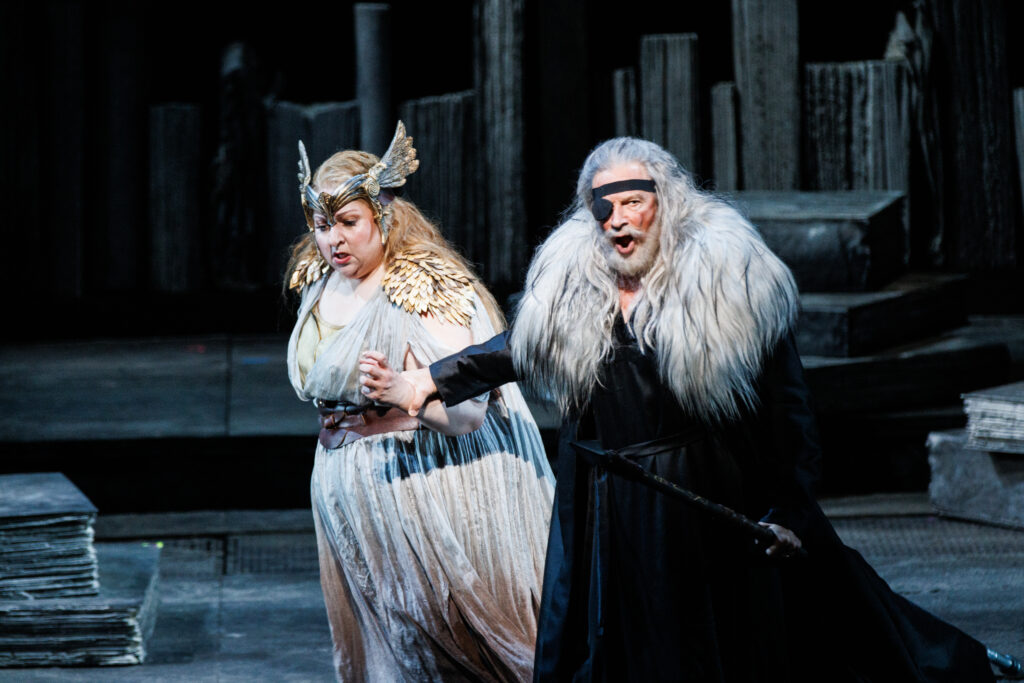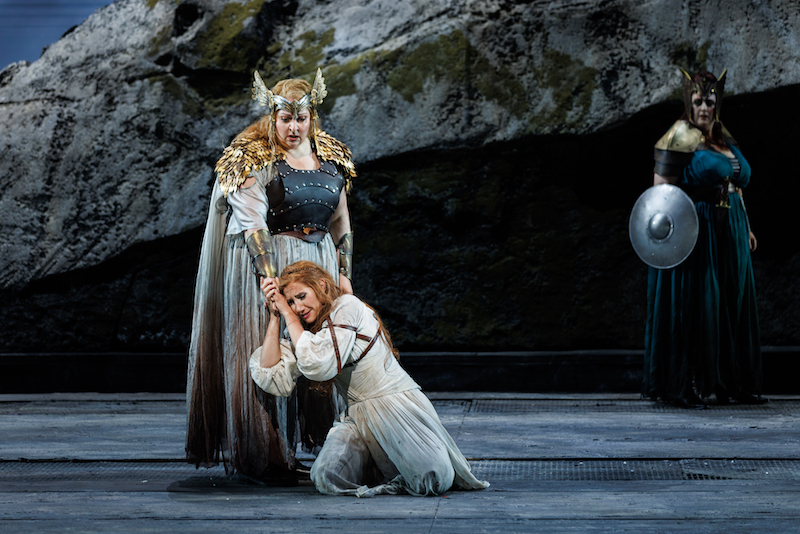Weep for joy, friends. The Atlanta Opera has assembled a magnificent world-class cast for the most challenging of operas.
Tomer Zvulun, general and artistic director of the Atlanta Opera, has called Die Walküre the most ambitious production in the company’s 45-year history. It succeeds splendidly thanks to the onstage talent, led by dramatic soprano Christine Goerke, perhaps the greatest Brünnhilde of our times.
Greer Grimsley, with his sonorous bass-baritone and commanding stage presence, returns from last season’s Das Rheingold as Wotan. This production allows Grimsley to display a larger dramatic range as the tortured king of the gods.
Three more performances remain of Die Walküre at the Cobb Energy Performing Arts Centre.

The plot of Die Walküre is convoluted, but it gets underway with the twins Sieglinde and Siegmund, who are separated in childhood long before the story begins. In Act I, they meet and fall in love, despite the fact that the two are siblings and Sieglinde is married.
This transgressive relationship infuriates Fricka, the goddess of marriage, who demands that Siegmund die in battle. But he’s saved by Wotan’s warrior-goddess daughter, Brünnhilde, the valkyrie of the opera’s title. Wotan then sets out to punish Brünnhilde for defying her father.
The uninitiated should be forewarned: This is a very long work. (Wisely, the Atlanta Opera has established early curtain times. Saturday’s opening performance began at 6:30 p.m. and, with intermissions, concluded about 11 p.m.)
Die Walküre is the most romantic and popular of the four operas in the Der Ring des Nibelungen cycle, and Wagner wrote some glorious though deliberately-paced music for it. It also includes some of his best-known music, including the “Ride of the Valkyries,” though that prelude to Act III occupies a small space in the four-hour-long music drama.
Wagnerian singers are a rare breed, which makes this opera challenging to cast. Few singers have the stamina and power to sing over Wagner’s lush orchestration.
Goerke, substituting for the entire run for an ailing Wendy Bryn Harmer, brought a blazing, clarion soprano to the opening night performance. Grimsley, one of the world’s few reigning Wotans, sang with dark, steely force but also displayed a lyrical warmth in his tender farewell to Brünnhilde.

Among the other fine singers in this production, Laura Wilde, with a radiant soprano, made a stunning Atlanta Opera debut as Sieglinde. It was a captivating performance, beautifully sung and arrestingly acted with a mix of vulnerability and assertiveness.
Viktor Antipenko evinced a vocal combination you don’t often hear in the role of Siegmund — lyricism combined with heroic heft. He sang Siegmund’s aria “Winterstürm” — on his back, no less — with mellifluous phrasing.
Raymond Aceto brought a robust stentorian bass to role of Hunding, Sieglinde’s husband. He was chillingly effective as a brutal domestic tyrant. Mezzo-soprano Gretchen Krupp was an imperious and opulent-voiced Fricka.
The eight other valkyries, whom we don’t get to see until Act III, were dynamite. I didn’t quite understand why they were gleefully stabbing what seemed to be dead bodies, but their singing — with their inhuman cries of “Hojotoho!” — was glorious.
The opera on opening night was masterfully conducted by Atlanta Opera Music Director Arthur Fagen, who drew polished playing from the pit orchestra. Fagen maintained an excellent balance, never overwhelming his singers. This was gorgeous Wagner, with burnished string playing and majestic brass sonorities. At last year’s Das Rheingold, I had longed occasionally for more bite in the brass and thunder from the percussion; that was not a concern this time.
Zvulun, as stage director, brought a dynamic momentum to an opera that can often be rather static on stage.
Erhard Rom’s sets were big but fairly minimalist: a concrete rectangular home for Act I; Wotan’s library of huge books for Act II; and a rocky landscape for Act III. Rom’s projections on a huge LED backdrop were evocative, though a couple of transitions seemed abrupt and awkward, including a change from day to night in Act III. I had mixed emotions about what seemed to be a projection of computer-designed horses during “The Ride of the Valkyries.”

Incidentally, the theme of corporate greed which figured heavily in last year’s Das Rheingold pretty much disappeared in this Die Walküre.
Having now produced the first and second operas in the cycle, Atlanta Opera plans stagings of the final two — Siegfried and Götterdämmerung — in 2025 and 2026, respectively.
Wagner demands a lot from his singers but also his listeners. Did I mention that this production is quite long? But if you miss this Die Walküre, you’re missing a historic Atlanta milestone. And you don’t want to do that, do you?
::
Paul Hyde is a longtime arts journalist and English instructor in Upstate South Carolina. He writes frequently for the Greenville Journal, South Carolina Daily Gazette and Classical Voice North America.







